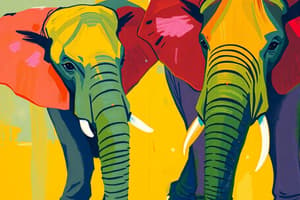Podcast
Questions and Answers
Which of the following best describes the primary difference between how elephants use 'names' and how dolphins and parrots use 'names'?
Which of the following best describes the primary difference between how elephants use 'names' and how dolphins and parrots use 'names'?
- Elephants communicate names through low-frequency rumbles, unlike dolphins and parrots that use high-frequency sounds.
- Elephants use individualized vocalizations not based on imitation, resembling human names; dolphins and parrots imitate the addressee's signature call. (correct)
- Elephants' 'names' are understood by the entire herd, whereas dolphins' and parrots' 'names' are only recognized by the individuals being addressed.
- Elephants use a wide range of vocalizations to represent different individuals, while dolphins and parrots use a single, specific call for each individual.
The research team, led by Dr. Michael Pardo, used machine learning to analyze elephant vocalizations. What was the primary challenge in this analysis, and how did machine learning help overcome it?
The research team, led by Dr. Michael Pardo, used machine learning to analyze elephant vocalizations. What was the primary challenge in this analysis, and how did machine learning help overcome it?
- The difficulty was the low frequency nature of elephant rumbles, which are hard for humans to decipher; machine learning was used to identify patterns and correctly guess the receiving elephant's identity. (correct)
- The primary challenge was the sheer volume of recorded calls; machine learning helped to filter the sounds and isolate the relevant vocalizations.
- The main obstacle was distinguishing between different elephant dialects; machine learning helped to standardize the calls for comparison.
- The challenge was attributing the vocalizations to specific elephants; machine learning used visual data to connect calls with individual elephants.
When researchers played back recorded 'rumbles' to 17 wild elephants, what critical aspect of the experimental design helped validate the hypothesis that elephants use individualized 'names'?
When researchers played back recorded 'rumbles' to 17 wild elephants, what critical aspect of the experimental design helped validate the hypothesis that elephants use individualized 'names'?
- The study tracked how quickly elephants responded to their 'names' to measure their level of understanding.
- The researchers analyzed the acoustic properties of each 'name' to confirm that they were distinct and easily distinguishable by elephants.
- The researchers compared the elephants' reactions to different types of vocalizations to determine if they responded more strongly to 'names'.
- The experiment monitored behavioral changes, such as changes in direction or vocal responses, to see if elephants reacted specifically to their own 'names'. (correct)
Dr. Joyce Poole's observations of elephants seemingly ignoring certain calls led her to hypothesize about elephants using 'names'. What crucial element did this anecdotal evidence contribute to the scientific process?
Dr. Joyce Poole's observations of elephants seemingly ignoring certain calls led her to hypothesize about elephants using 'names'. What crucial element did this anecdotal evidence contribute to the scientific process?
The article mentions that the computer model correctly guessed the receiving elephant's identity 28 percent of the time. Considering the complexities of animal communication, what is the most reasonable interpretation of this percentage?
The article mentions that the computer model correctly guessed the receiving elephant's identity 28 percent of the time. Considering the complexities of animal communication, what is the most reasonable interpretation of this percentage?
If further research reveals that elephants use different 'names' for the same individual depending on context (e.g., alarm calls vs. social greetings), what would this imply about the cognitive complexity underlying elephant communication?
If further research reveals that elephants use different 'names' for the same individual depending on context (e.g., alarm calls vs. social greetings), what would this imply about the cognitive complexity underlying elephant communication?
Given that elephants are known for their intelligence, empathy, and communication skills, how might the discovery of 'names' contribute to conservation efforts?
Given that elephants are known for their intelligence, empathy, and communication skills, how might the discovery of 'names' contribute to conservation efforts?
The researchers plan to investigate whether elephants use 'names' for things other than individuals. If they discover that elephants also categorize objects or locations with specific vocalizations, what broader implications would this have for our understanding of animal cognition and communication?
The researchers plan to investigate whether elephants use 'names' for things other than individuals. If they discover that elephants also categorize objects or locations with specific vocalizations, what broader implications would this have for our understanding of animal cognition and communication?
Flashcards
Elephant 'Names'
Elephant 'Names'
Individual identifiers used by elephants to address each other.
Elephants: Unique Naming Species
Elephants: Unique Naming Species
The only non-human species, besides humans, known to use unique identifiers to address each other without imitation.
Dr. Michael Pardo
Dr. Michael Pardo
Biologist and lead author of the elephant naming study.
Dr. Joyce Poole
Dr. Joyce Poole
Signup and view all the flashcards
Elephant Rumbles
Elephant Rumbles
Signup and view all the flashcards
Machine Learning in Elephant Communication
Machine Learning in Elephant Communication
Signup and view all the flashcards
ElephantVoices
ElephantVoices
Signup and view all the flashcards
Kenya National Parks
Kenya National Parks
Signup and view all the flashcards
Study Notes
- Elephants possess exceptional intelligence, empathy, and communication skills.
- Elephants assign individual "names" to each other.
- Elephants are the first non-human species to exhibit this capability.
How Elephant Names Differ from Other Animals
- Dolphins and parrots imitate the signature call of the addressee.
- Elephants do not rely on imitation.
- Elephant naming is more similar to how human names work.
Research Observations
- Dr. Joyce Poole observed elephants calling out, with only one responding.
- The rest of the group would continue feeding, seemingly oblivious to the call.
- Lead Dr. Poole to wonder if the mammals called each other by specific names.
Study Details
- The research team selected over 600 recorded elephant calls, or "rumbles".
- The calls were collected over almost 30 years from wild elephants in Kenya's National Parks.
- Researchers used machine learning tools to analyze the audio due to the sounds low frequency.
- The computer model correctly guessed the receiving elephant's identity 28 percent of the time.
- Elephants probably do not use names all the time.
Verification of Findings
- Some of the rumbles were played back to 17 wild elephants through a speaker to verify findings.
- The elephants only reacted to calls meant for them while ignoring the rest.
- The mammals were more likely to address each other by name over long distances or when calling out to their calves.
Study Publication and Future Research
- The study was published in the journal Nature Ecology and Evolution on June 10, 2024.
- Dr. Pardo and his team aim to explore whether elephants also "name" other important elements, like food, water, and locations.
Studying That Suits You
Use AI to generate personalized quizzes and flashcards to suit your learning preferences.
Description
Elephants demonstrate unique communication skills by assigning individual 'names' to each other, a trait previously unseen in non-human species. Unlike dolphins and parrots, they don't imitate calls but use distinct vocalizations. Research in Kenya's National Parks analyzed elephant rumbles to understand this naming behavior.





